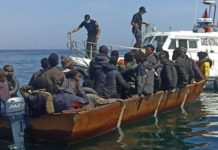Libya’s situation, after Muammar Gaddafi’s regime fell in 2011, is extremely indented and complicated, from any point of view. The first factor explaining its complexity, from a geographical point of view, is the size of its own surface, so extended that it is the 4th African Country, and the 18th in the world, over its physical size. It’s been always considered a unique region in its history, yet two relevant territories do exist in several occasions, Tripolitania and Cyrenaica, with different and often totally opposing cultures and ideologies. Yet, invaders, colonists, dictators who have come in succession in the centuries, have always preferred to consider it as an only entity. The former Italian colony overlooks the Mediterranean on the Sirt Gulf, between the 10th and the 25th East Meridian. From a political point of view, the Country is divided in two main governments: Tripoli’s Presidential Council, the international community recognizes and headed by Fayez Serraj, and Tobruk’s House of Representatives (HOR), headed by Ageela Saleh Issa. Despite the strength of the Libyan National Army (LNA), not able to absorb all Libya’s armed militias as of today, the Country’s situation after 2011 fell into a heavy economical, medical and, above all security crisis, as security completely lacks in some Southern areas, where armed groups fight each other’s for several reasons. Exploiting that chaos, the Country has become a breeding ground for the jihadist galaxy’s ideas to spread, in particular with Islamic State and Al Qaeda taking shelter in the Sahara and in many cities, as the Libyan Attorney General Sadek Assour explained in a recent press conference in the Capital. Just yesterday October 4th, 2017, the latest terrorist attack took place in Misrata, causing several dead and about 20 injured the medical staff of the field hospital in the city, run by an Italian mission, took in charge of. The violence escalation and the atmosphere of insecurity lead the Western diplomatic delegations to leave the Country over the years. Italy opened its own embassy in Tripoli, closed for two years, just back last January. A friendly gesture to the Libyan people, but also a deep trust in the stabilization process of the Country a big part of the illegal migratory flows goes through from the African continent to the Italian coasts. Since January on, the Italian diplomatic team has carried out several initiatives in the name of reconciliation and to improve the life conditions of the Libyan people, affected by countless sufferings. In order to fully understand all the complicated Libyan phaenomena, also referring to the recent diplomatic meetings, we’ve got in touch with the Ambassador Giuseppe Perrone, with whom we’ve gone deep into most of the main relevant and current topics.
– Ambassador Perrone, what activities for our embassy? Which missions in Libya, as of today?
“The Italian embassy in Tripoli, being the only Western one there as of today, has a wide range of ongoing activities we for first struggle to understand, given that it’s a very huge amount. Clearly, it’s about following the political process: our support, our push to the ongoing political dialogue to overcome the de facto partition still existing in the Country, all the initiatives to promote reconciliation; yet, at the same time, through its embassy in Tripoli, Italy is very committed to promoting stability and security. Clearly, initiatives to control the illegal migratory flows and to fight the traffic of human beings are a higher point on our operative agenda. This is a perspective including several kinds of initiatives, starting from the purely security ones, aimed at reinforcing the abilities of the Libyan security agencies, to other initiatives focusing on development, aimed at supporting the communities affected by the illegal phaenomena. The presence of Italy as the only Western Country in Tripoli, and in Libya, is much noted and appreciated by the Libyan people. Libyans see the embassy, with all its activities on the entering visas – still the only Country – and with its services to the people, as a constant and reliable reference. Concerning the Italian missions in the Country, we have a relevant medical, humanitarian, mission in the city of Misrata with the field hospital that is still open in it, taking care and assistance to the wounded. Yesterday a terrorist attack happened and our hospital moved forward to take care of the people injured in it. Then, we have the naval mission, recently approved by the Italian government and now here in Tripoli, providing the Libyan Navy and Coast Guard with an essential assistance, helping them to rebuild and to reinforce their ability to employ the Libyan sovereignty in all the sectors and in all the regions of the Country”.
– We know that safety heavily lacks in Libya. What does it mean, as far as it concerns to you and our officials? Have you ever been in danger?
“Clearly, Libya has an extremely fragmented security, as a unified army working under a change of command recognizable and leading to the political authority still lacks. This causes challenges and problems. It causes episodes of absent security and a high risk we are fully aware of. The Italian embassy works in Libya with an adequate system of protection and this is part of the political investment our Country is doing – it does it in Libya and in safety – by establishing everything needed for the diplomatic mission to work. Risky situations surely happen, but the staff in charge addresses them every time much professionally in cooperation with the Libyan services working on that and always guaranteeing a completely efficient collaboration and presence”.
– Many Libyans do not always look at positively to the foreign actions. As the news spread that the Italian naval mission, you were referring to a while ago, had been approved, we know protests took place. Was anyone unhappy with General Khalifa Hafter recently visiting Rome?
“It’s true the naval mission was variously welcomed when it got started, as several critics rose up, especially in the East of the Country, fearing an external interference. When we explained pervasively and to all the players in the Country what the mission was about, thus that it was aimed at reinforcing Libya’s sovereignty rather than weakening it, also the way it was perceived radically changed. Over the signal of support to Libya, we found an extremely positive welcome and we’ve already seen some considerably relevant results, giving an essential contribute to the lowering of the illegal migratory flows to Europe. Yesterday, for example, the first ship of the Libyan Navy went out to the sea after a long time. We’re helping the bodies of the Libyan defence to get back on their feet”.
– Our daily, followed by other international media such as The Guardian, spread the news that some videos from the US blog Justice Security would show Tobruk’s strongman as responsible of several summary executions after the International Criminal Court (ICC) has condemned Commander Warfalli. Do you believe there will be any follow up to Hafter?
“There will be a follow up for sure, as there is an inquiry ongoing. Allegations are much professional and in-depth, so that they must be explored as to the full scope. I can’t tell who will be involved, as I can’t judge an inquiry’s outcome before it is shown, but it is surely a really professional inquiry the ICC is going to address the most professionally”.
– Our government has recently confirmed its own support to the UNSMIL initiative. Has been a mission with Italian troops in the South of the Country foreseen?
“No. Full-court supporting activities have been foreseen, also over the South of the Country, as we think that the illegal migration can’t be contained without any intervention on the security of the Southern borders. Our strategy’s goal is exactly to reinforce the Libyan abilities over controlling the Country’s Southern borders. In this sense, we’re working with the border guard and with all the Libyan services in charge in order to get this breakthrough on the ability to control the Southern borders; yet, it does not foresee any Italian military presence on the Libyan ground, rather it concerns a support to the Libyan agencies and forces working on controlling the territory and the borders”.
– UNSMIL’s Special Representative to Libya, Ghassan Salamé, opened the political process to everyone, just excluding the extremists by their own choice. Do you think it’s possible for the Gaddafi family to return? Particularly, how can Saif al-Islam, the Rais’ favourite son, bypass the condemnation from the ICC?
“Ghassan Salamé has employed the right approach: an inclusive process welcoming all those who want to sincerely participate, all those who are available to confront with the others. Because Libya, today, needs everyone, needs to overcome this internal fragmentation and partition. As for the single people, I just can’t tell you. As for Mr. Saif al Islam, an international arrest warrant is pending on him. I’ve seen Ghassan Salamé told press he’d have opened up to all the Libyans, to the supporters of the former regime too, yet the international juridical procedures will surely make their courses”.
-Over this “opened up to everyone”, do you think that also the Justice & Construction Party (JCP) representing the Muslim Brotherhood in Libya and headed by Mohamed Sawan, will run for elections?
“You should ask to Mohamed Sawan, but I think that an inclusive approach means that all the ones willing to join the political process in a pacific and constructive way, they can do it. The ones taking up the arms and willing to change the Libyan political scenario through the violence, or the ones who aim to pursue political goals through the military confront, they remain out of that”.
– Do you see any strong figure who is able to have the consensus of both the people and the social, tribal, authorities?
“I’d depersonalize the Libyan politics, especially at a moment when they need to find an agreement, a reconciliation, as well as the ability for the players to confront each other. Even the stronger personalities, with a huge support, trigger heavier resistance in other parts of the Country. A reason for letting the solution to emerge from a real willingness of compromise and reconciliation between Libyans, rather than trying to find a solution to Libya’s problems by charging an only person of doing it; and that’s in order for everyone to respect, then, the rules of the game they’re going to write down”.
– Is there any debate in the Interior Ministry, on whether to reopen our skies to Libya? Or better, do you think the flights with Libya will be established back in the medium term?
“I really hope so. This is a top priority both for the Italian government and the Libyan one and it’s been openly repeated more than once even in the recent meetings between Libya and Italy; it’s something requiring technical answers in order for the direct flights to get resumed, with Italy for first, as the Libyans really expect this from us. It would be an event with a really high symbolic value as it would mark, somehow, the end of the isolation the Libyan people have been restricted to for too long”.
Just a last question. Any news about the interests of the Italian businessmen in Libya?
“Italy has been the only Country that has openly said, through its Ministry of Foreign Affairs, we’re not waiting for conditions of internal harmony, or durable stability, in order to resume our economic relations with Libya. We’re going to act right now, clearly gradually and respecting the security conditions on the ground. We’re already doing it. Italy is the Country engaged more than anyone with resuming the economical collaboration with Libya, being aware that the economic growth is one of the elements, of the most relevant factors to stabilize the Country. We are also aware of the previous problems, clearly, that several Italian businessmen suffered in Libya; that’s why we’re also seeking for an overall solution with the Country’s authorities, allowing to all the commercial and financial relations between our Countries of fully spreading their own capabilities”.













